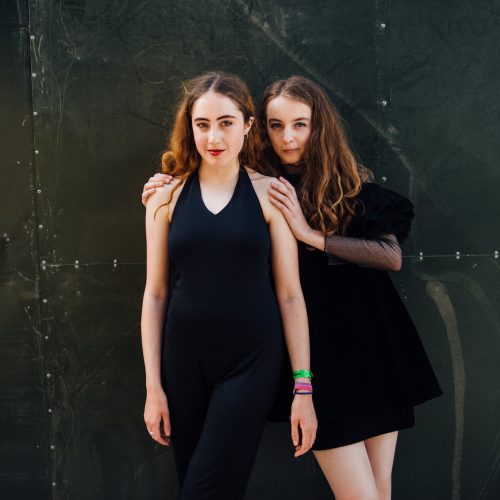My sister and I are not twins–she is a year and four months older than I am–but we’ve been mistaken for twins before. We spoke the language of twins. We weaved together inside jokes and shared experiences and we draped them over ourselves, like a quilt kids crowded under to tell ghost stories at slumber parties. We watched the same shows, we visited the same websites, we played the same games. We were each other’s companion to the world, someone to trade banter with as we explored unfamiliar terrain.
Eventually, we went to college. We didn’t talk to each other as much. We didn’t listen to the same music. I didn’t play as many games as she did. We stopped seeing the world in the same way. Sometimes we run out of things to talk about. But this isn’t necessarily a loss, just a change. Words may fall out of fashion, but the language adapts all the same.
Rosa Walton and Jenny Hollingworth, the English duo behind Let’s Eat Grandma, aren’t twins; they aren’t even siblings. But their dynamic has been defined by a twin-like telepathy that bordered on the uncanny, starting with the inside joke of their group name. (It’s an example from a grammar textbook about the importance of commas: “Let’s eat, Grandma!”). Their debut album was called I, Gemini, after all, and they wrote their music as though they were one person. Unless you watched them perform, it was very difficult to tell where Walton ended and Hollingsworth began.
That began to change in 2018. As Hollingworth tells it, it was more complicated than just falling out. “It wasn’t as simple as ‘oh, you hurt me by saying this.’ It was like: we are fundamentally misunderstanding each other in some way.” Walton moved to London, and tried writing music on her own. As their profile rose with their then-recent album I’m All Ears, the condition of Hollingworth’s boyfriend, Billy Clayton, worsened. He had Ewing’s sarcoma, a rare form of bone cancer, and while it had been held at bay when they first met things would devolve from there. He died in the spring of 2019, and Hollingworth didn’t write music for a year afterwards.
Let’s Eat Grandma’s upcoming album, Two Ribbons, is the first where the duo wrote songs separately rather than together (although they did offer lyrical contributions to each other.) The title track, which will close the album, is by Hollingworth, and it takes stock of the duo’s relationship: all the things that will never change, and all the things that will never be the same.
“Two Ribbons” sometimes sounds like a breakup song, although it’s not about a breakup and it’s not even about a romantic couple. Hollingworth emphasizes the emotional intimacy by paring back Let’s Eat Grandma’s sound. There are no traces of the debut’s psychedelia or I’m All Ears’ serrated bubblegum: there’s just a guitar, strumming and thrumming insistently, as Hollingworth says what she means. Her piping soprano may not sound as raw as, say, Julien Baker’s voice, but she’s working in a similar mode.
What’s immediately clear is how much Walton means to Hollingworth. She opens with the image of the title: two ribbons, fraying yet intertwined, tight enough to bruise. Hollingworth juxtaposes delicacy and strength: something as dainty as ribbons, squeezing each other, holding on for dear life. There’s a beauty to it, but there’s also a sense of desperation. These ribbons may be fraying, but they’re holding on for as long as they’re physically able. “I haven’t thought for weeks of anyone but you,” Hollingworth admits, without shame.
But she also understands that the dynamic has changed, and will never go back to the way things were. Hollingworth and Walton are no longer toddlers complimenting each other’s snail drawings. They are musical partners in an indie-famous duo, whose continued existence relies upon a connection that may not last forever. Furthermore, one half of the duo has suffered an unimaginable loss, and while the other half can sympathize and do whatever she can to help, she simply can’t experience Hollingworth’s loss in the same way. “I can only be your best friend,” Hollingworth sings, “and hope that that’s enough/But I know that’s not enough.” As on their older songs, the point of view is ambiguous; unlike on their older songs, it makes a difference as to whether it’s one or the other, and both possibilities are devastating.
“Two Ribbons” is a song for a friendship at a turning point. Things have changed irrevocably, and I doubt either Walton or Hollingworth knows what the future holds. But they do know that, no matter how dark or frightening things get, there is a path forward. The ribbons may fray, but they’ve stayed intertwined for this long. Every relationship, platonic or otherwise, shifts and changes, but if the core stays the same, that can be enough.







